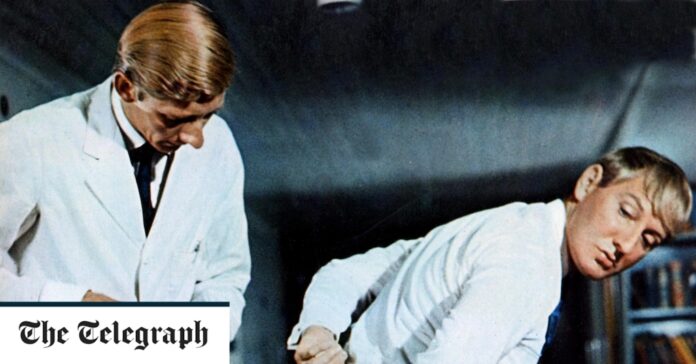How a serious man of medicine – and Dirk Bogarde – gave the rascally star the witty, lightly comic role the Carry On films never could
Amidst the many characters that the great Leslie Phillips, who has died at the age of 98, should be celebrated for is none other than Dr Gaston Grimsdyke: medical practitioner, preening roue and all-round cad. Dr Grimsdyke appears in the sixth of the Doctor films, Doctor in Clover, and establishes himself almost immediately as the kind of man who one would usually strive to avoid in intimate situations. We learn that he has been fired from his previous role as a medical officer in a men’s prison (misbehaviour with the Governor’s daughter) and that he has wound up at St Swithin’s Hospital, ostensibly in an attempt to turn over a new leaf and make a difference to the lives of the patients, but in fact Dr Grimsdyke’s primary interest lies in attempting to seduce the nurses, much to the weary contempt of his superior, James Robertson Justice’s Sir Lancelot Spratt.
Doctor in Clover was made in 1966, after the success of such Carry On films as Carry On Cleo, Carry On Spying and Carry On Cowboy, and so it is little surprise that the kind of humour that it displays – from a script by Jack Davies, who had written Those Magnificent Men In Their Flying Machines the previous year, and directed by Ralph Thomas, brother of regular Carry On director Gerald – is bawdier and more innuendo-based than the earlier films in the Doctor series.
Yet this shift away from light-hearted medical-based humour (with a touch of satire towards the newly formed NHS, if one cared to look hard enough) towards something much more akin to the misadventures of Williams, James, Hawtrey et ali was a reflection of what the public wanted, and also the way in which the author of the Doctor novels, Richard Gordon, had shifted his own writing: what had begun as light-hearted semi-autobiography inexorably turned into trouser-dropping farce. It may not have been subtle, but it suited the persona that Phillips was developing by the mid-Sixties, of the dashing rake, down to a “t”.
Gordon was a pseudonym for the doctor Gordon Ostlere, who practiced medicine until 1952, when, after the success of his debut novel Doctor in the House, he was able to abandon a life as an anaesthetist and ship’s surgeon in favour of a career writing.


